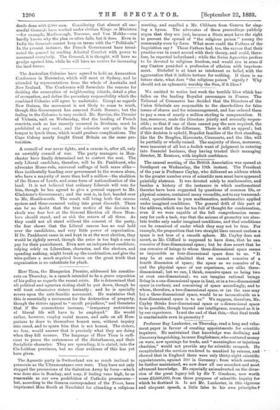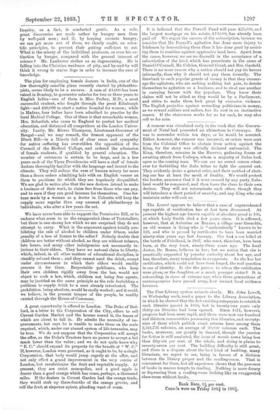Professor Ray Lankester, on Thursday, read a long and vehe-
ment paper in favour of creating appointments for scientific. inquirers. He maintained that knowledge was declining and discovery languishing, because Englishmen, who scattered money on wars, new openings for trade, and "meaningless or injurious charities," would not provide any for scientific research. He recapitulated the servi.2es rendered to mankind by science, and - showed that in England there were only thirty-eight scientific appointments, against 300 in Germany ; from which country,. he further maintained, we now draw all our soundest and most- advanced knowledge. He especially animadverted on the diver- sion of the great legacy left by Sir T. Gresham, now worth some £3,000,000, from those purposes of scientific inquiry for which he destined it. Is not Mr. Lankester, in this vigorous and eloquent speech, a little false to his own principles ?
Inquiry, as a fact, is conducted gratis. As a rule, great discoveries are made rather by hungry men than by well-paid men ; and if, by keeping savants hungry, we can get more out of them, we clearly ought, on scien- tific principles, to prevent their getting sufficient to eat. What is the misery of the individual professor, or even his ex- tinction by hanger, compared with the general interest of science ? Mr. Lankester strikes us as degenerating. He is falling into the Christian weakness of pity, and by-and-by will think it wrong to starve dogs in order to increase the sum of 'knowledge.



































 Previous page
Previous page